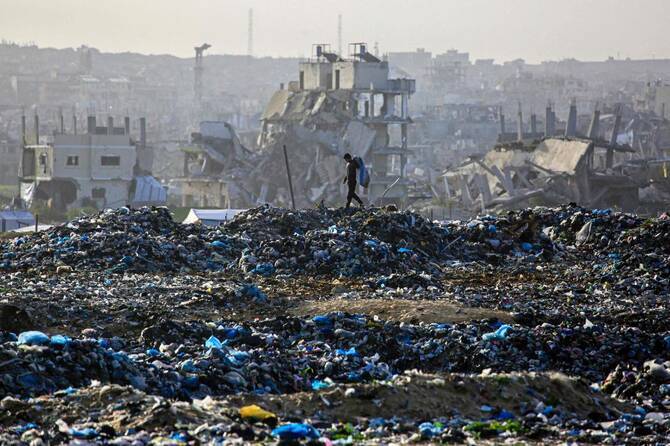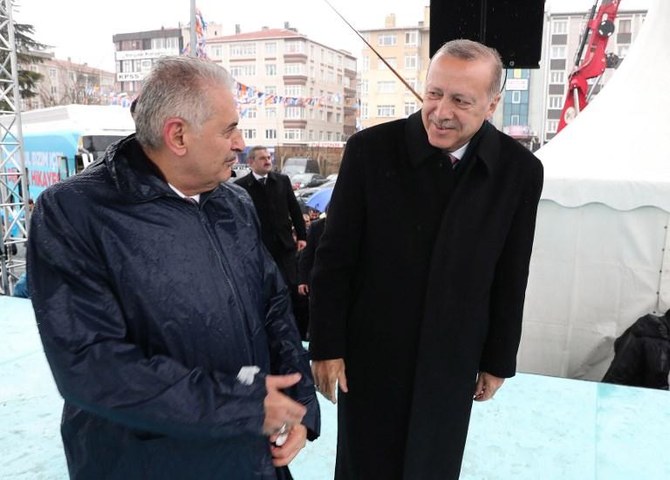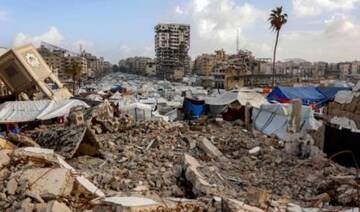ISTANBUL: If former Turkish prime minister Binali Yildirim wants a reminder of how much he needs to win as Istanbul mayor in this month’s election, he just has to listen to his boss.
President Recep Tayyip Erdogan, who started his own political career as Istanbul mayor, likes to tell his Justice and Development Party (AKP) that winning the country’s economic hub is like winning Turkey itself.
Picking a well-known name and ruling party heavyweight like Yildirim for mayor shows how key Istanbul remains for Erdogan. The Turkish leader has been campaigning hard around Turkey, often in Istanbul, to drum up support for the AKP before the March 31 municipal election.
Even though Yildirim is the favourite, the stakes are high: Turkey’s economy is in recession and a lira currency crisis and double-digit inflation are threatening to undermine some AKP support at the ballot box.
“We should not underestimate the Istanbul mayor office. Look at Mr.Chirac,” Yildirim told AFP referring to Jacques Chirac, the late French president who was mayor of Paris from 1977-95 in between two stints as prime minister.
The vote in Istanbul, with a population of 15 million out of Turkey’s 80 million, will be a major test for Erdogan’s party to consolidate its power. Istanbul is seen as a political bellwether with its mixed population of secular and conservative Turks as well as Kurds.
In the 2017 referendum on the new executive presidential system that concentrated powers under the Turkish leader, Istanbul narrowly voted against Erdogan’s plan.
“Istanbul is a country on its own,” he said.
Erdogan is actively touring for the AKP even though he is not standing for election. In Istanbul alone, he has held over a dozen rallies in several neighbourhoods in the past few weeks.
On Sunday, Erdogan called a giant rally, with his right-wing ally Nationalist Movement Party (MHP) leader Devlet Bahceli in Istanbul’s Yenikapi district.
Fielding a younger candidate, the opposition Republican People’s Party (CHP) hopes a fresh approach will help them take the Istanbul mayor’s office from Erdogan’s ally.
Ekrem Imamoglu, 49, current mayor of Istanbul’s Beylukduzu district on the outskirts of the city, worked in a family business and was a board member of a Turkish football team.
A loyalist to Erdogan since the 1990s, Yildirim holds no grudge over the disappearance of the prime minister office he held for two years. He even campaigned for “Yes” in the 2017 vote on reforms that handed Erdogan more authority.
“Two captains can sink a ship. There should be only one captain,” he said at the time of the vote that abolished the premier’s office.
Yildirim, born into a poor family in an eastern province, served as transport minister between 2002 and 2014 and oversaw grandiose projects from new highways and high-speed trains to tunnels and bridges.
Erdogan often touts such projects as a symbol of Turkey’s success during his time in power. But Yildirim has never shown any ambition to outshine the president.
Known for his slow-talking style, the AKP candidate says in the introduction of a rap tune prepared for his election: “I speak slow but I work fast like my surname.” His surname means “lightning.”
Yildirim never makes secret of his love for Istanbul.
“Istanbul is all my youth, a city that has given me everything, so to serve this city is a big honor for me,” Yildirim said.
Asked if his boss Erdogan was giving him advice, Yildirim said: “Of course. We always benefit from his experiences.”
Both candidates have shown an appetite to win over the other’s side’s supporters in the cosmopolitan city.
At one campaign rally, religiously conservative Yildirim was seen saluting residents drinking beer at street tables in Istanbul’s Kadikoy district on the Asian side, which is known as a CHP bastion.
And Imamoglu, in a video on social media, was seen reciting the Qur'an at Eyup mosque — for Muslims massacred in New Zealand attacks this month — in an AKP stronghold.
Imamoglu hopes his discreet profile could turn out to be an “advantage,” against a popular AKP candidate.
“Society has recently built a resistance against all that is well known in politics,” he told AFP.
The CHP candidate lamented that conditions were not equal, especially with most Turkish media taking a pro-Erdogan line. But he was still in the fight.
“I am a man who produces ideas for Istanbul’s win,” he said. “To serve a large city like Istanbul... and think about its future goes beyond everything.”
Turkey’s ex-premier squares up for Istanbul election battle
Turkey’s ex-premier squares up for Istanbul election battle

- Turkish President Recep Tayyip Erdogan is trying to build support for his AKP party
- He hopes the new mayor of Istanbul will be a supporter of his political party
Israeli fire kills two in Gaza as truce deal moves to next phase

- Medics said two men were killed by Israeli forces in eastern Khan Younis
- The two sides have traded blame over the truce violations
CAIRO: Israeli fire killed at least two Palestinians in Gaza on Thursday, health officials said, in the latest violence rattling a fragile ceasefire as Hamas and Israel looked to implement the second phase of the US-brokered Gaza peace plan.
Medics said two men were killed by Israeli forces in eastern Khan Younis, in an area adjacent to where the army operates. The Israeli military told Reuters it wasn’t aware of any casualties as a result of Israeli fire on Thursday.
The Gaza health ministry said Israeli airstrikes, tank shelling and gunfire have killed at least 490 people since the truce took effect in October after two years of war that widely demolished the Palestinian enclave.
Israel said four soldiers have been killed by Palestinian militants in the small coastal territory over the same period.
The two sides have traded blame over the truce violations.
By advancing to phase two, the US and mediator partners Egypt and Qatar must confront the more contentious issue of Hamas disarmament, which the group has long rejected. The plan also calls for deploying an international peacekeeping force.














